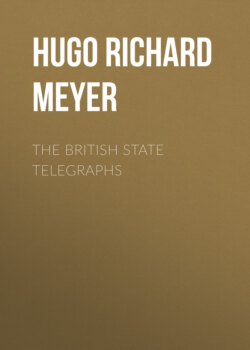Читать книгу The British State Telegraphs - Hugo Richard Meyer - Страница 5
На сайте Литреса книга снята с продажи.
CHAPTER II
The Argument for the Nationalization of the Telegraphs
ОглавлениеTable of Contents
The indictment of the telegraph companies. The argument from foreign experience. The promise of reduced tariffs and increased facilities. The alleged financial success of foreign State telegraphs: Belgium, Switzerland and France. The argument from British company experience.
In 1856 the Chambers of Commerce of Great Britain, under the leadership of the Chamber of Commerce of Edinburgh, began an agitation for the purchase by the Government of the properties of the several British telegraph companies. In 1865, the telegraph companies, acting in unison, withdrew the reduced rate of twenty-four cents for twenty words, address free, that had been in force, since 1861, between certain large cities. That action, which will be described further on, caused the Chambers of Commerce to increase the agitation for State purchase. In September, 1865, Lord Stanley of Alderley, Postmaster General, commissioned Mr. F. I. Scudamore, Second Secretary of the Post Office, “to inquire and report whether, in his opinion, the electric telegraph service might be beneficially worked by the Post Office—whether, if so worked, it would possess any advantages over a system worked by private companies—and whether it would entail any very large expenditure on the Post Office Department beyond the purchase of existing rights.”
In July, 1866, Mr. Scudamore reported, recommending the purchase of the telegraphs. In February, 1868, he submitted a supplementary report; and in 1868 and 1869, he acted as the chief witness for the Government before the Parliamentary Committees appointed to report on the Government’s Bills proposing to authorize the State to acquire and operate the telegraphs.4 The extent to which the Government, throughout the considerations and negotiations which finally ended in the nationalization of the telegraphs, relied almost exclusively upon evidence supplied by Mr. Scudamore, is indicated in the statement made by the Chancellor of the Exchequer, Mr. G. W. Hunt, on July 21, 1868, that Mr. Scudamore “might be said to be the author of the Bill to acquire the telegraphs.”5
Indictment of the Telegraph Companies
Mr. Scudamore reported that the Chambers of Commerce, and the various writers in the periodical and newspaper press who had supported the proposal of State purchase, had concurred in the following general propositions: “that the charges made by the telegraph companies were too high, and tended to check the growth of telegraphic correspondence; that there were frequent delays of messages; that many important districts were unprovided with telegraphic facilities; that in many places the telegraph office was inconveniently remote from the centre of business, and was open for too small a portion of the day; that little or no improvement could be expected so long as the working of the telegraphs was conducted by commercial companies striving chiefly to earn a dividend and engaged in wasteful competition with each other; and, finally, that the growth of telegraphic correspondence had been greatly stimulated in Belgium and Switzerland by the annexation of the telegraphs to the Post Offices of those countries, and the consequent adoption of a low scale of charges; and that in Great Britain like results would follow the adoption of like means, and that from the annexation of the British telegraphs to the British Post Office there would accrue great advantage to the public, and ultimately a large revenue to the State.” Subsequently, before the Select Committees of Parliament, Mr. Scudamore maintained that in the hands of the State the telegraphs would pay from the start.
Mr. Scudamore continued his report with the statement that he had satisfied himself that in Great Britain the telegraph was not in such general use as upon the Continent; that “the class who used the telegraphs most freely were stock brokers, mining agents, ship brokers, Colonial brokers, racing and betting men, fruit merchants and others engaged in business of a speculative character, or who deal in articles of a perishable nature. Even general merchants used the telegraphs comparatively little, compared with those engaged in the more speculative branches of commerce.” He added that from 1862 to 1868 the annual increase in the number of telegraphic messages had ranged pretty evenly from 25 per cent. to 30 per cent., indicating merely a gradual increase in the telegraphic correspondence of those classes who had been the first to use the telegraphs. He said there had been none of those “sudden and prodigious jumps” that had occurred on the Continent after each reduction in the charges for telegraphic messages, or after each extension of the telegraph system to the smaller towns.
Mr. Scudamore held that it was a serious indictment of the manner in which the telegraph companies had discharged their duties to the public, that the small tradesman had not learned to order goods by telegraph, and had not thereby enabled himself to get along with a smaller stock of goods kept constantly on hand; that the fishing villages on the remote coasts of Scotland that had no railways, had no telegraphs; that the public did not send “millions of messages” of this kind: “I shall not be home to dinner;” “I will bring down some fish;” “You can meet me at four;” and that the wife and children, away from their home in the country village, did not telegraph to the husband and father: “Send me a money order.” Mr. Scudamore’s notions of the uses to which the telegraphs ought to be put were shared by the Chancellor of the Exchequer, Mr. Hunt, who looked forward to the day when “persons who have a difficulty in writing letters will have less difficulty in going to a telegraph office and sending a message to a friend than writing a letter.”6
